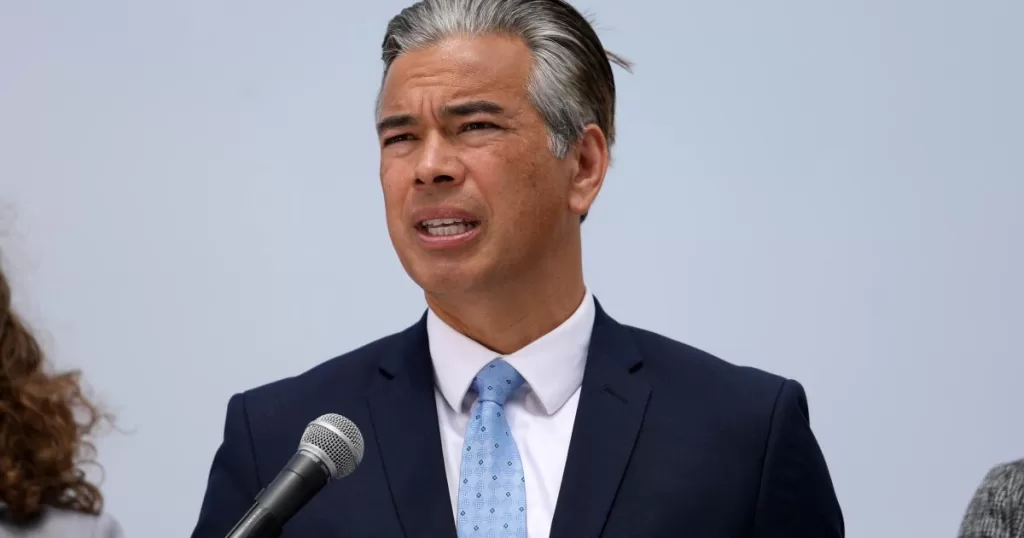California Atty. Gen. Rob Bonta has filed a first-of-its kind lawsuit aimed at ExxonMobil Corp. — one of the largest producers of petroleum-based polymers — for allegedly deceiving the public about the potential for plastic recycling and creating an environmental blight that has cost the state billions of dollars to clean.
Bonta is seeking to compel the oil giant to “end its deceptive practices.” He is seeking to secure an abatement fund, disgorgement (a legal remedy that requires a party to give up profits or other gains that were obtained illegally or unethically) and civil penalties “for the harm inflicted by plastics pollution upon California’s communities and the environment.”
The suit was filed Monday morning in the San Francisco County Superior Court.
A separate lawsuit, filed by a consortium of environmental groups — including the Sierra Club, Surfrider Foundation, Heal the Bay and Baykeeper — was also announced Monday.
“For decades, ExxonMobil has been deceiving the public to convince us that plastic recycling could solve the plastic waste and pollution crisis when they clearly knew it wasn’t possible,” said Bonta in a statement. “ExxonMobil lied to further its record-breaking profits at the expense of our planet and possibly jeopardizing our health.”
The suit comes almost two and a half years after Bonta launched an investigation into the fossil fuel and petrochemical industries for their alleged role in causing and exacerbating a global crisis in plastic waste pollution.
At the time, Bonta said he’d subpoenaed ExxonMobil Corp. seeking information related to the company’s “historic and ongoing efforts” to minimize the public’s understanding of the harmful consequences of plastic.
Securing documents via subpoena, Bonta says they have the evidence and documentation required to sue the company on a variety of legal grounds.
In a statement, Bonta said the lawsuit shows the “fullest picture to date” of the oil giant’s “decades-long deception.”
The two lawsuits allege that the oil company violated state natural resources, water pollution, false advertisement, unfair competition and nuisance laws.
Bonta is seeking injunctive relief in order to protect the state’s natural resources from further pollution and destruction, as well as to stop the company “from making any further false or misleading statements about plastics recycling and its plastic operations.”
Fossil fuels, such as oil and gas, are the raw material of most plastics. In recent decades, the accumulation of plastic waste has overwhelmed waterways and oceans, sickening marine life and threatening human health.
The announcement of the two lawsuits comes as state lawmakers seek to reduce plastic pollution at its source, with the passage and implementation of SB54, the Plastic Pollution Prevention and Packaging Producer Responsibility Act — which seeks to turn the onus and cost of plastic pollution away from taxpayers and consumers and onto the producers and packagers.
It also comes amid a growing body of research showing the pernicious and ubiquitous nature of microplastics in the environment and within human bodies.
Micro- and nanoplastics are produced when plastic products break down. Petroleum-based plastics never fully decompose; they break down into smaller and smaller pieces, which have now been found in the deepest trenches of our oceans, in the snows atop the highest mountains, in our air, water, food and bodies.
Environmentalists hailed the dual lawsuits as much-needed corrections on an industry that has for decades produced products that have infiltrated the state’s waterways and contaminated human bodies.
“For 40 years, the Surfrider Foundation has been fighting to protect our ocean, waves, and beaches… Despite these tireless efforts, 85% of items collected in our California beach cleanups in 2023 were still single-use plastics,” said Jennifer Savage, the Surfrider Foundation’s senior plastic pollution initiative manager. “Now, for the health of our ocean and the people who depend on it, we’re taking this fight to court to hold Exxon accountable for their contribution to the plastic pollution crisis.”
Oceana’s Christy Leavitt, plastics campaign director, said that “recycling is like trying to mop water from an overflowing bathtub while the faucet is still running. We need to turn off the faucet and reduce the production of single-use plastics… If companies won’t reduce their production, then governments must ensure they do.”
On Sunday, Gov. Gavin Newsom signed a bill that would close a loophole in a 2014 plastic bag ban that still allowed for some plastic bags to be sold at checkout lines.
Studies have shown that the two biggest contributors of microplastics in the environment are car tires and synthetic clothing. However, as the plastic industry expands and the number of single-use plastic items grow, so, too does their contribution to environmental contamination and pollution. Around 151 million tons of single-use plastics were produced from fossil fuels in 2021. That number is expected to rise another 19 million tons by 2027.
Newsletter
Toward a more sustainable California
Get Boiling Point, our newsletter exploring climate change, energy and the environment, and become part of the conversation — and the solution.
You may occasionally receive promotional content from the Los Angeles Times.
